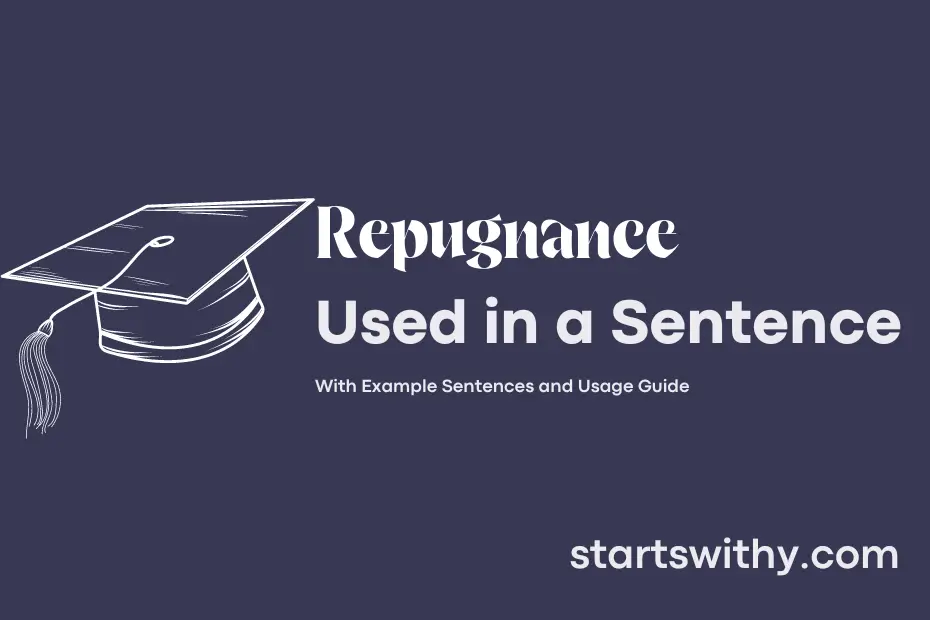Do you ever come across a sentence that fills you with repugnance? Maybe it’s the subject matter, the tone, or the underlying message that strikes a chord with you. “Repugnance” refers to a strong feeling of disgust or aversion towards something, a reaction that makes you recoil in distaste.
When encountering a sentence that evokes repugnance, emotions can run high as personal values and beliefs come into play. Understanding the power of words to elicit such strong reactions can provide insight into the impact language can have on our thoughts and feelings.
7 Examples Of Repugnance Used In a Sentence For Kids
- Eating a rotten fruit filled me with repugnance.
- I felt repugnance when I saw a cockroach in the kitchen.
- The smell of spoiled milk made me cringe with repugnance.
- I turned away in repugnance when I saw a pile of trash on the street.
- Repugnance washed over me when I saw slimy worms in the garden.
- The sight of a muddy puddle filled me with repugnance.
- I felt repugnance when I accidentally stepped on a squishy bug.
14 Sentences with Repugnance Examples
- Repugnance towards plagiarism is vital for maintaining academic integrity.
- Cheating in exams is met with widespread repugnance among fellow students.
- The idea of eating insects may initially evoke feelings of repugnance.
- Many students expressed their repugnance towards the outdated curriculum.
- The behavior exhibited at the party was met with repugnance from the college community.
- The lack of hygiene in the college cafeteria is a source of repugnance.
- Students should feel a sense of repugnance towards discrimination of any kind.
- The political corruption in the student council was met with repugnance.
- The prospect of unpaid internships can lead to feelings of repugnance among students.
- The professor’s offensive comments were met with repugnance by the entire class.
- There was a collective sense of repugnance towards the company’s unethical practices.
- The lack of diversity in the college’s curriculum sparked feelings of repugnance.
- The student’s disrespectful behavior towards the faculty was met with repugnance.
- The college’s handling of sexual harassment cases raised feelings of repugnance among students.
How To Use Repugnance in Sentences?
Repugnance is a word used to express feelings of strong dislike or aversion towards something. When using this word in a sentence, it’s important to keep in mind its meaning and context. Here is a helpful guide on how to use repugnance in a sentence for beginners:
-
Understand the Meaning: Before using the word repugnance, make sure you understand its definition. It refers to a strong feeling of disgust or aversion towards something.
-
Choose the Right Context: Use repugnance when you want to convey a strong sense of dislike or aversion towards something. It is often used to describe feelings of disgust, revulsion, or repulsion.
-
Construct Your Sentence: When constructing your sentence, make sure to place repugnance in the appropriate context. For example, “The idea of eating insects filled her with repugnance.”
-
Use Proper Grammar: Ensure that your sentence is grammatically correct when using repugnance. This will help convey your message effectively.
-
Practice Using the Word: To become more comfortable with using repugnance in a sentence, practice incorporating it into your writing or everyday conversations.
By following these guidelines, beginners can effectively use repugnance in a sentence to express their feelings of strong dislike or aversion towards something.
Conclusion
In conclusion, the examples of sentences with “repugnance” illustrate a strong feeling of disgust or aversion towards something. This word conveys a powerful sense of revulsion and rejection, often used to describe intense feelings of dislike or disapproval. These sentences demonstrate how “repugnance” can effectively convey a deep sense of displeasure or moral offense towards a particular subject or situation, emphasizing the speaker’s strong negative emotions.
By examining how “repugnance” is used in various contexts, it is evident that this word carries a weighty connotation of distaste and objection. Whether expressing personal distaste for a particular food or moral objection to an unethical action, sentences with “repugnance” highlight the intensity of the speaker’s feelings of aversion and reinforce the strength of their sentiments.



